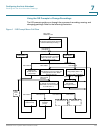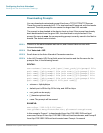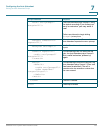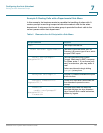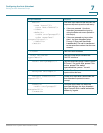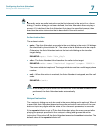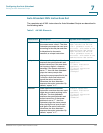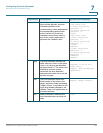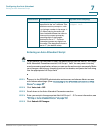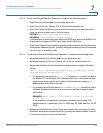
Configuring the Auto Attendant
Writing an Auto Attendant Script
SPA9000 Voice System Administration Guide 143
7
TIP Generally, enter an audio instruction as the first element in the script. In a <form>
dialog, if <audio> dialog is not been defined, the Auto Attendant does not play a
prompt. If it is defined, the Auto Attendant first plays the specified prompt, then
executes the action instruction that is described in the next section.
Action Instruction
The actions include:
• goto—The Auto Attendant proceeds to the next dialog in the script. All dialogs
are identified by the attribute “id”. The value in the id attribute must be unique.
Otherwise, the Auto Attendant selects the last valid dialog as the transfer
target dialog.
EXAMPLE: <goto link= “dir_dlg”>
• xfer—The Auto Attendant blind transfers the caller to the target.
EXAMPLE: <xfer name= “Technical Support” target= “5000”/>
The name attribute is optional. The target attribute must be a valid target phone
number.
• exit —When this action is reached, the Auto Attendant is stopped, and the call
ends.
EXAMPLE: </exit>
NOTE In one dialog, only one action can be defin0ed. After the xfer or exit action is
performed, the Auto Attendant ends automatically.
Noinput Instruction
The <noinput> dialog can only be used in the menu dialog and is optional. When it
is specified, Auto Attendant executes the audio and action instructions if the user
does not input any digits with the value of the <timeout> parameter, in seconds.
If the repeat attribute is set to T, the Auto Attendant plays the menu prompt after
playing the prompt specified in the <noinput> dialog and ignores the action
instruction. If the value is F, the Auto Attendant executes the action instruction. The
default value of the repeat attribute is F.




